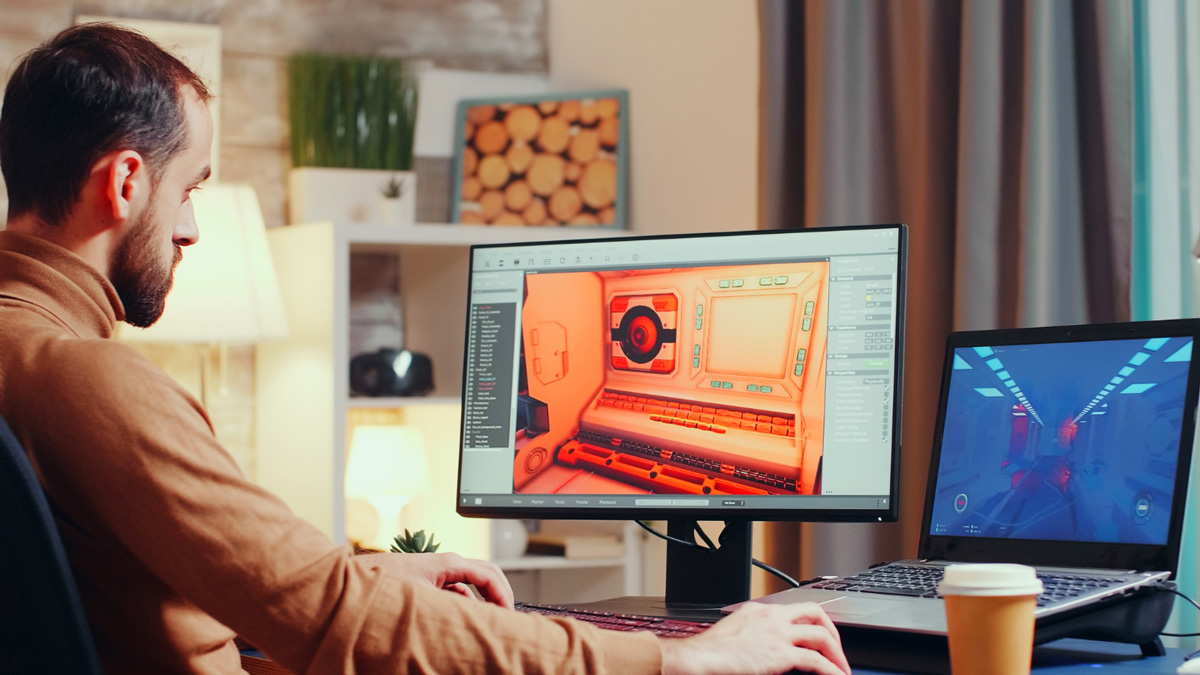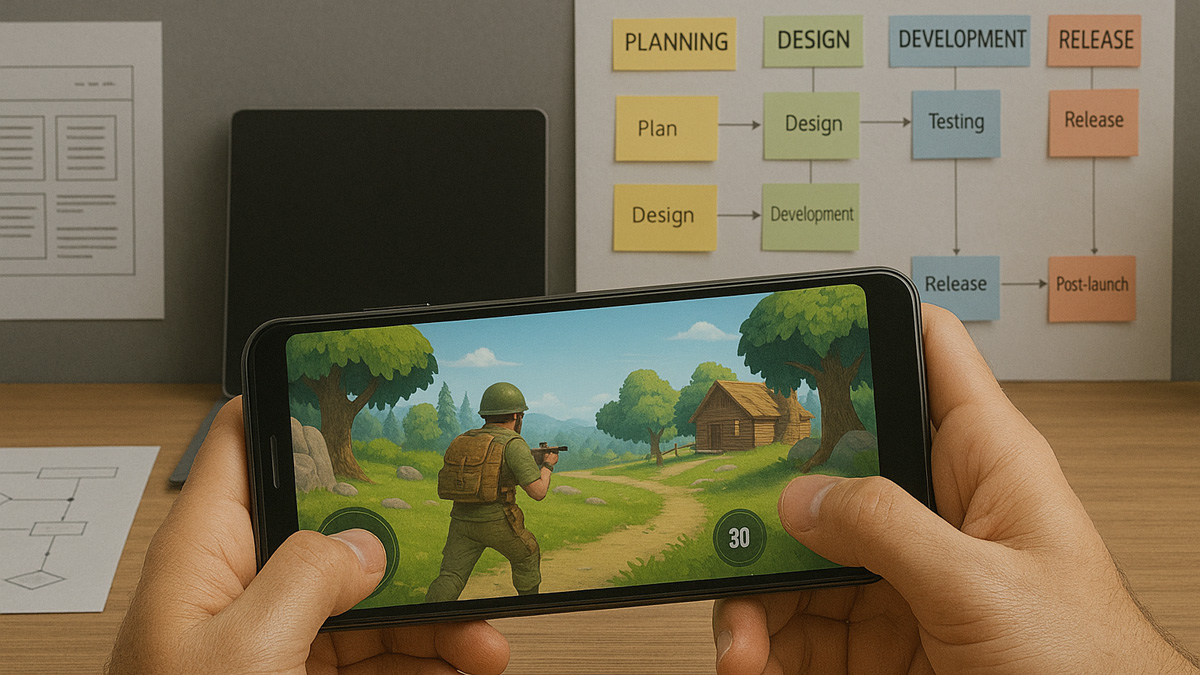
Are you interested in making games but don’t know where to start? Are you feeling lost in the vast world of game development and can’t figure out your path? Do you need to be an expert in specific fields to begin? If you’ve been asking yourself these questions, don’t worry—this article is for you.
To step into the game development industry, you need to have certain skills that help you create lasting projects. Game development, which has gained a lot of attention recently, can be a great fit for people interested in programming and graphic design.
Strengthening Your Skills
To get started, let’s briefly look at the basic team you need to make a game. At its smallest, a game team needs a programmer who also has a bit of knowledge in graphics. That’s because while graphics are important, they’re not the core of game development.
A programmer with basic graphic skills can start building a game and even create a playable prototype. On the other hand, if you’re a graphic designer, it’s a good idea to team up with a programmer so you can support each other’s weaknesses.
Below, we’ll go over the key skills you’ll need to get your first game off the ground.
-
Programming
The heart of game development is programming. A programmer alone can take a game from an idea to a playable prototype. That says a lot about how essential programming is to the process.
Once you’ve built up your English skills, the next step is learning to code. Some popular programming languages for games include Python, Java, JavaScript, PHP, Ruby, Go, C#, and C++.
These languages are all modern and widely used in recent years. After learning one of them, you should get familiar with a game engine. Unity, for example, is a powerful and popular engine that uses C# or JavaScript for scripting.
2. Graphics Design
As mentioned earlier, graphic design is a helpful skill that can support game development, but it’s not enough on its own. To get into game development, you should first work on the priorities mentioned above. Then, with basic graphic knowledge, you can round out your skill set.
If you already have strong graphic skills, you’ll need to focus more on learning programming. But if you’re a coder, you can use online templates and basic design skills to create a prototype of your idea.
3. Ideation
Once you’ve started learning and building your skills, it’s time to come up with your game idea. Maybe you have a vivid imagination and tons of ideas, or maybe you feel stuck. Either way, don’t worry!
You just need to keep a few tips in mind to help organize your thoughts. At first, you might feel like your ideas are silly, especially if you lack confidence or experience—but remember, great ideas come from practice. So don’t be afraid to value your basic ideas. Just don’t get too attached to any one of them.
Don’t Have an Idea?
If nothing is coming to mind, stay calm. There are lots of ways to spark ideas. We’re not talking to the people with too many ideas here—we’re focused on those who are completely stuck.
One great tip for coming up with game ideas is to browse social media. Believe it or not, many big companies get their initial inspiration from things they find online. Any type of entertainment that captures public interest can inspire a popular game.
And here’s one last reminder: whether you have an idea or are looking for one, try not to get overly attached to it.
Don’t Take On Too Much
After brainstorming, your head might be full of ideas. It’s best to write them all down, categorize them, and choose the best one. For your first game, keep the idea simple and easy to execute. Aim to appeal to a general audience—it’ll make your job easier.
The first reason this matters is that beginners need to start with simpler games to build experience before tackling big, complex projects. A good starting point is casual or hyper-casual games. These require simple ideas and save time and money while still being popular among users.
Casual and hyper-casual games are so widely enjoyed because they offer quick, fun experiences. Their addictive nature makes them great for new developers to practice and grow in a professional yet manageable space. These styles also prepare you for creating bigger games down the line.
Creativity
Another important point: ‘Keep the idea simple—but not too simple.’ Yes, simplicity is key, but don’t forget creativity! Adding small elements like daily rewards or scoring-based features can make your game more exciting and addictive.
Always ask yourself, ‘How can I make this game less boring?’ To find the answer, put yourself in the player’s shoes. What would make *you* want to keep coming back to a game?
Practice, Practice, Practice
No matter your skill level, you can start making games—just take the first step. Begin with targeted practice. Imagine you’re on a team developing a game for a major company. You need to design, code, and deliver a working prototype. That mindset will help guide your efforts. Keep practicing because that’s how real skills are built.
Failure Is Just the Beginning!
You’ve probably heard a million motivational quotes. Maybe you’re great at giving pep talks to friends. But seriously—if you never fail while learning game development, something’s not right. Every big studio has failed many times before they succeeded. They didn’t get stuck on one idea.
Expect that your early ideas will be rejected. Your alpha version might get criticized or even turned down by a studio. But instead of giving up, focus on improving. You’re just getting started and you’re going to face feedback—so stay positive and keep going.
Final Thoughts
These days, game development is super attractive because of the big money it can bring in. But even though it looks exciting, it can also feel overwhelming at first.
This field takes effort and practice. You’ll need time for trial and error, and most importantly, you have to keep pushing forward. Thanks for reading all the way to the end!
Social Media Post Text
If you’re stepping into game development for the first time, there are some key things you should know. First, since game development relies heavily on tech, you’ll need to strengthen your programming and English skills.
The industry starts with programmers and later involves graphic designers. So if you want to succeed, start by learning a programming language and a game engine.
Remember, this path has ups and downs. Your ideas might get rejected and you’ll have to start over. For more, read the article ‘Tips You Should Know Before Making Your First Game’.

HosseinDigital Marketing Expert
